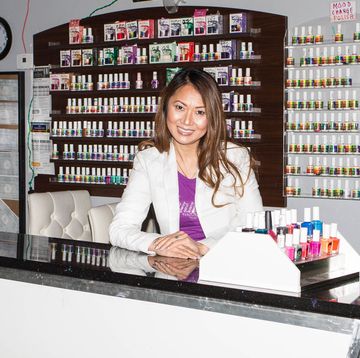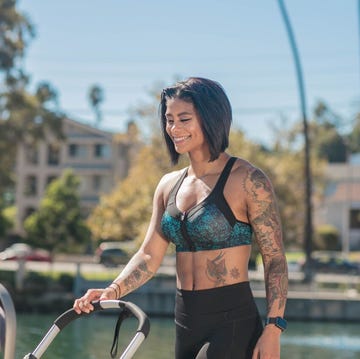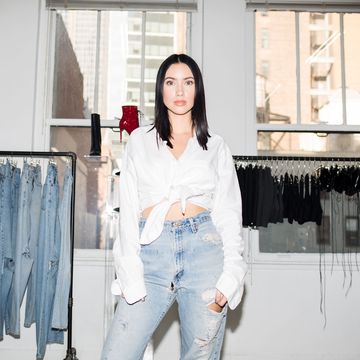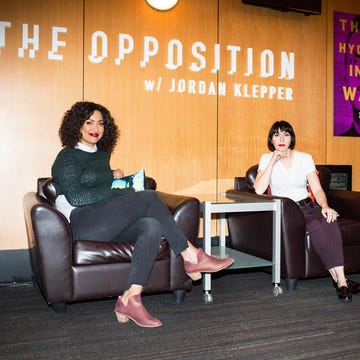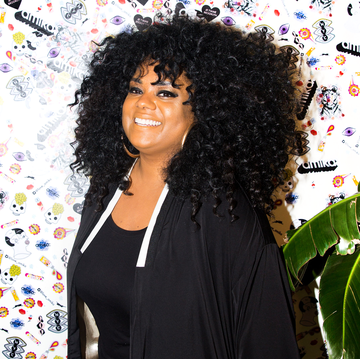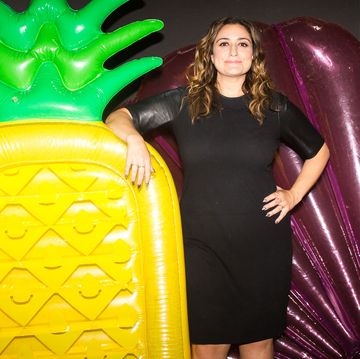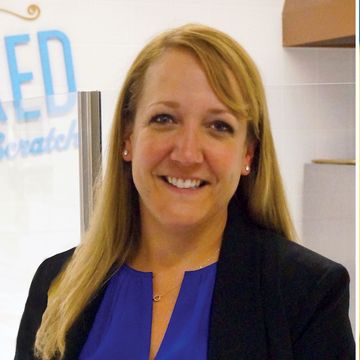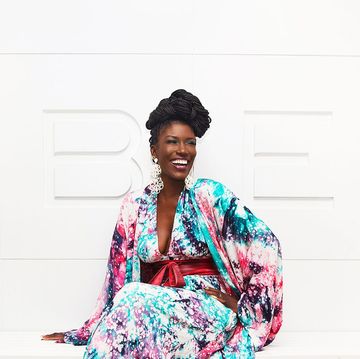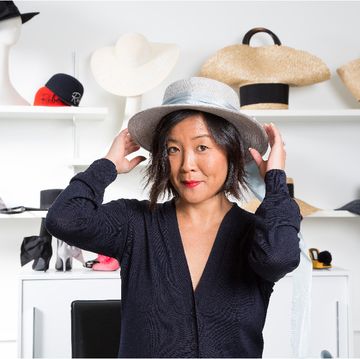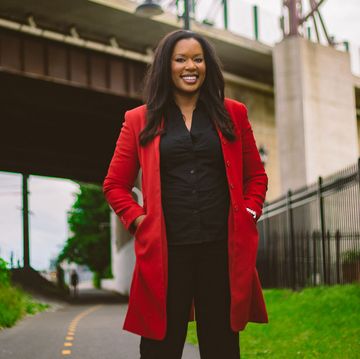When Mikaela Mayer discovered boxing at 17, she gave up her social life, scrapped her plans of becoming a model, and invested all her time and focus in a sport that she says changed her life. By the time women's boxing became an official Olympic sport in 2012, she was poised to be one of the best fighters in the country. Today she is a two-time national champion, the no. 1 ranked female boxer in the U.S. in the 132-pound weight division, and a top contender for the 2016 Olympic Games.
The now-24-year-old took a break between fights to talk about overcoming setbacks and investing everything she has into a career that she loves.
I grew up in the San Fernando Valley outside of Los Angeles. I was a little bit of a rebellious teenager. During high school, I was ditching a lot and doing lots of things I probably shouldn't have been doing at that age.
My junior year I ended up in continuation school — that tiny school attached to the big school where all the kids who aren't doing great go. They told me I wasn't going to graduate on time. I had an epiphany, and I realized this isn't where I was supposed to be. I knew I was better than this. I wanted to do something positive. So I started with picking up a new sport.
I had always played sports growing up — soccer, gymnastics, and a little motocross racing and snowboarding. When I hit that high school age, I wasn't doing anything productive. I was mainly going out partying, hanging out, and drinking.
There was a Muay Thai gym by my house. Muay Thai is a very physical style of kickboxing — you're allowed to use elbows and knees. I took the last $75 out of my bank account, signed myself up, and I became obsessed with it. I had a very technical teacher who stressed perfection. I had to learn proper form, and how to work the mitts and the bag, along with learning calisthenics and basic conditioning training. It was hard, but it also came somewhat naturally. Just a few months in, I decided I wanted to be the best female fighter in the world.
I had just turned 17. I gave up going out on Friday nights because I wanted to get up and train. I'd walk home from school to my job as a receptionist. Then as soon as I was done working, I'd throw on my running shoes and run to the gym. It was about two miles each way. I'd do my workout and then run back. And I did that every day.
After I started showing up to the gym regularly, I went to the guys' classes to train because there were only four girls in the gym and they only had classes twice a week. I wanted to be there six days a week. My teacher saw my dedication and took me under his wing and helped me develop. He would run me early in the mornings, take me to other gyms to spar, help me with diet and conditioning, and all the stuff I once knew nothing about.
Sooner or later my friends stopped calling me because I wouldn't want to go out anymore. It shifted everything in my life. I became very focused, very ambitious and very hungry for success. I ended up busting my butt in school and graduating early.
For the next year I trained and competed in Muay Thai smokers [amateur fighting competitions between different gyms]. I took my first fight after six months and had a total of 10 Muay Thai fights going 10–0 until I transitioned to boxing.
My coach thought it would be good experience for me to start training in boxing to develop my Muay Thai technique. My first boxing fight was in East L.A. when I was 18. I didn't even have the proper gear. I boxed in running shoes, a tank top, and some old Muay Thai shorts. But I stopped the girl in the second round. I just went crazy. I threw my hands and threw my hands. There was no strategy to it. But I loved it. I never went back to Muay Thai.
Before I found boxing, I was convinced that I wanted to be a model. I think it was just the idea of being a model that sounded cool to me. I was young and wanted to do something glamorous and cool. I started pursuing it at about 15. I posed for people's portfolios and tried to get an agent. I was definitely more of an aspiring model. But once I really got into boxing, I realized that's what I wanted to do. Boxing gave me a purpose and a passion, which is the most important thing you can find. I found it early, which is so great.
When I first started competing, we'd show up to local boxing gyms on the weekends. We'd sign up in my weight class and hope that another girl would sign up too with the same experience and same weight. Most of the time they wouldn't, but that was the only way to get fights at that amateur level.
You start off in small club shows at local boxing gyms, and you work your way up to national championships. When you win a national championship, that's when you start to gain recognition with USA Boxing. You develop a ranking, they take you to international tournaments, and you work your way up the ladder that way.
I started boxing in 2008 and won my first National Golden Glove title in 2009. A week before the tournament, my dad told me I should go. It was so last-minute I didn't even bring a coach. I had $300 saved, and my dad helped me with my plane ticket to Florida.
This was different than any previous fight. It was a tournament, so I would need to fight my way through a bracket in hopes of winning all my fights and take the gold. Before I [would] only fought one girl and it [would be] done. There were also girls from different states at this tournament, girls who had been boxing longer then me and were more experienced. Although the competition was nowhere near where it is today, winning that championship made me feel as though I belonged in the sport.
By the time I was 20, I had about 40 fights under me, but I had just come off a couple of losses. I didn't feel like going to the gym because I didn't feel like I was getting the proper training. I didn't feel challenged anymore. My dad found a scholarship program at Northern Michigan University where you can train with a really good coach and you can go college too. I said, "Let's just do it." He called the office and got a hold of the coach and convinced him to let me come up there. I was enrolled within two weeks.
I received a 75 percent scholarship to NMU. I trained twice a day, took four classes, and bartended at night. It was the only boxing program in the United States at the time. And it offered a scholarship to college. So, for me, it was a dream come true.
Once I got to Michigan, everything was a bit more structured. I was with a team now. There was one other girl on the team out of a total of 10 of us. My coach, Al Mitchell, was a two-time Olympic coach, now a three-time Olympic coach. I went there thinking I was a decent boxer, and he completely broke me down. He made me feel like I knew nothing. It didn't make me feel discouraged. I was completely ecstatic about it. I thought, Wow, I have a really good coach and I'm going to learn so much here. I've been with him ever since.
But a semester in, they cut the funding to the program. The program was there for 25 years, and out of it came many national champions and several Olympians. However, USA Boxing just didn't have the money to continue funding it. So I lost my scholarship, and I moved back to L.A.
That didn't stop me from continuing my training with Coach Al. I went back and forth between Cali and Michigan for three years to train with him for every fight. He was the best, and I knew it. He would let me stay at his house for every training camp we had. He trained me every day, put a roof over my head, fed me, and traveled with me to all my tournaments, never charging me a dime.
After six months with him, I had qualified for the Olympic Trials in 2012, which was the first year that women's boxing was added to the Olympics. I didn't even think about the Olympics when I first started boxing because it wasn't an option. But when they announced it, my dad said, "Well, are you going to go for it?" And I said, "I don't see why not?" It's been a goal of mine ever since.
I went in there with every belief that I could win it. I won my first fight and then lost to the Olympian [Queen Underwood] in the second fight. It was a really close fight, and there was nothing left to do but just suck it up and move on to the double elimination. And tournaments are never double elimination — they are always single-elimination. I was getting a second chance. The next three fights after that were great. I was getting sharper with every fight. And then that sixth fight comes where I have to fight the Olympian again in the finals. It had been six days of fighting back to back, and I was so exhausted and sore. I had to pull myself together. I knew this was it, and I had to fight for my spot.
I lost by two points. But I left that fight proud of myself. I knew at the end of that tournament that I had done the best I possibly could. When you know that, you can't be mad at yourself. And I think that's when I really got my respect from other athletes and USA Boxing because they knew that I was a top contender. I said in the interviews right after, "I'm going for 2016." I knew right away that my dream wasn't over and I just had to chase it. I hadn't even hit my peak yet.
To this day, fights feel the same. You never get used to it. There are always going to be nerves. You just go over the strategy with your coach, walk into that ring, and once that bell goes off, you're in the zone and all the nerves go away. And then it's all over. I don't think about hitting someone in the face. When you get up and do something every day for so many years, it's routine. I do my run. I go to the gym. I have a fight. When I first started training, there were girls who would burst into tears after getting hit, and that's what separates us. You can either deal with getting punched in the face or you can't.
Two weeks after the Olympic Trials were the U.S. Nationals. There are only three Olympic weights in boxing and one representative for each on the U.S. Team. Because I had lost to the Olympian in the 132 weight class, I had a choice: If I wanted to make the national team I had to either go up to the 141 weight class or go down to 125. I had like a week. I didn't want to cut down to 125. I'm already skinny, I didn't want to be much tinier, so I went up to the 141 class, even though I weighed nowhere near 141. All you have to do to qualify is weigh an ounce more than the weight class below you. In order to fight at 141, I had to weigh at least 132.1. I ate a bagel just before I stepped on the scale to weigh in, and I think I came in at 133.
I won the U.S. Nationals at that weight and made the National and the World teams [representing the United States in continental and global events]. That was a really great year because although I wasn't going to the Olympics, I still had a chance to win a bronze medal at the World Championships in China. And I won a gold medal at the Continental Championships in Canada. Then I was chosen to go to London to be the Olympian's training partner. So I got to go to the Olympics and see it, which was still a dream for me. It was an amazing year for my boxing career and kept me motivated.
I never get paid for my fights. The first time I ever made money from boxing was in 2013 when I landed an endorsement deal with American Family Insurance and a national commercial with Dr. Pepper. It was a great feeling when an athlete gets that kind of recognition from a major company. They just called me one day and asked if I wanted to work with a national campaign with Dr. Pepper/Snapple. That was amazing. Being an athlete, we make our money through sponsorships and endorsements. That was a really good way to help support myself on this Olympic dream.
I knew that it was not a high-paying career path, but I always believed in myself. I was bartending as I worked my way up in the boxing world. That was the easiest money, and I could get all my training done during the day. Working a 9-to-5 would be impossible if I was going to make training a priority. Once you make the national team, USA Boxing pays you a stipend every month, but the real money comes from gaining your own sponsors and endorsements. That is the goal, along with winning, of course. They are both important and both take a different set of skills.
With the Olympics being a year away, I chose to move to Michigan permanently about eight months ago and train with Coach Al full time. The money from my endorsement deals in 2013, bartending on the weekends, and my monthly stipend from USA Boxing all help me to make ends meet and focus 100 percent on training.
My training regimen has changed a little bit because this semester, I had the idea of enrolling myself back into college at Northern Michigan University. I probably picked the worst year to do that. After winning U.S. Nationals in January, my travel schedule is ridiculous. I am working toward Olympic trials, which will take place at the end of October. I will have a good amount of fights between now and then. There will be a round robin against four other countries in Atlanta next month. After that are the Pan American Games and then the Continental Games.
I'm taking 13 credits, pursuing business and marketing. One class is online, and the other ones I'm just going to have to talk to my professors. They seem to be pretty cool so far. When I'm traveling, I'm just going to have to stay on top of my work and my reading, and communicate over email. As long as they're willing to work with me, I feel like I can make it happen.
I get up, I go to class, I go do my run, I go back to class, I come home for about an hour, then I go back to the gym to do my boxing workout. I have the evenings off, and I try to study. My days are just crazy.
There have definitely been times when I've doubted my journey, which everyone does. You're not always winning; the money isn't always rolling in. There are times when I'm like, Is this realistic? Can I do this? Am I wasting my time? And I've had moments when I wasn't getting the respect I thought I deserved. There are those times you have to just keep going, keep believing in your journey no matter what. That's what separates somebody who ends up accomplishing her goals from somebody who doesn't.
Being an athlete and training for the Olympics isn't like any other sport. There is no backup plan. The competition in this world doesn't allow for that. You sacrifice everything else in the world to chase the Olympic dream. The chances, let's be real, are slim. It happens to a small percentage of us. It takes a strong, dedicated person to shape the dream. This is what I do. I train for this. I want to fight. I want to win.
I'm focused on the Olympics and my boxing career, but I also want to get my degree. I feel like it can help me manage my own career. I also want to own my own clothing and fitness line. And I eventually want to own my own gym. I think a lot of opportunities and doors are going to open for me, things I don't even know about yet. And I'll just see where everything takes me.
Get That Life is a weekly series that reveals how successful, talented, creative women got to where they are now. Check back each Monday for the latest interview.
Follow Heather on Twitter.



